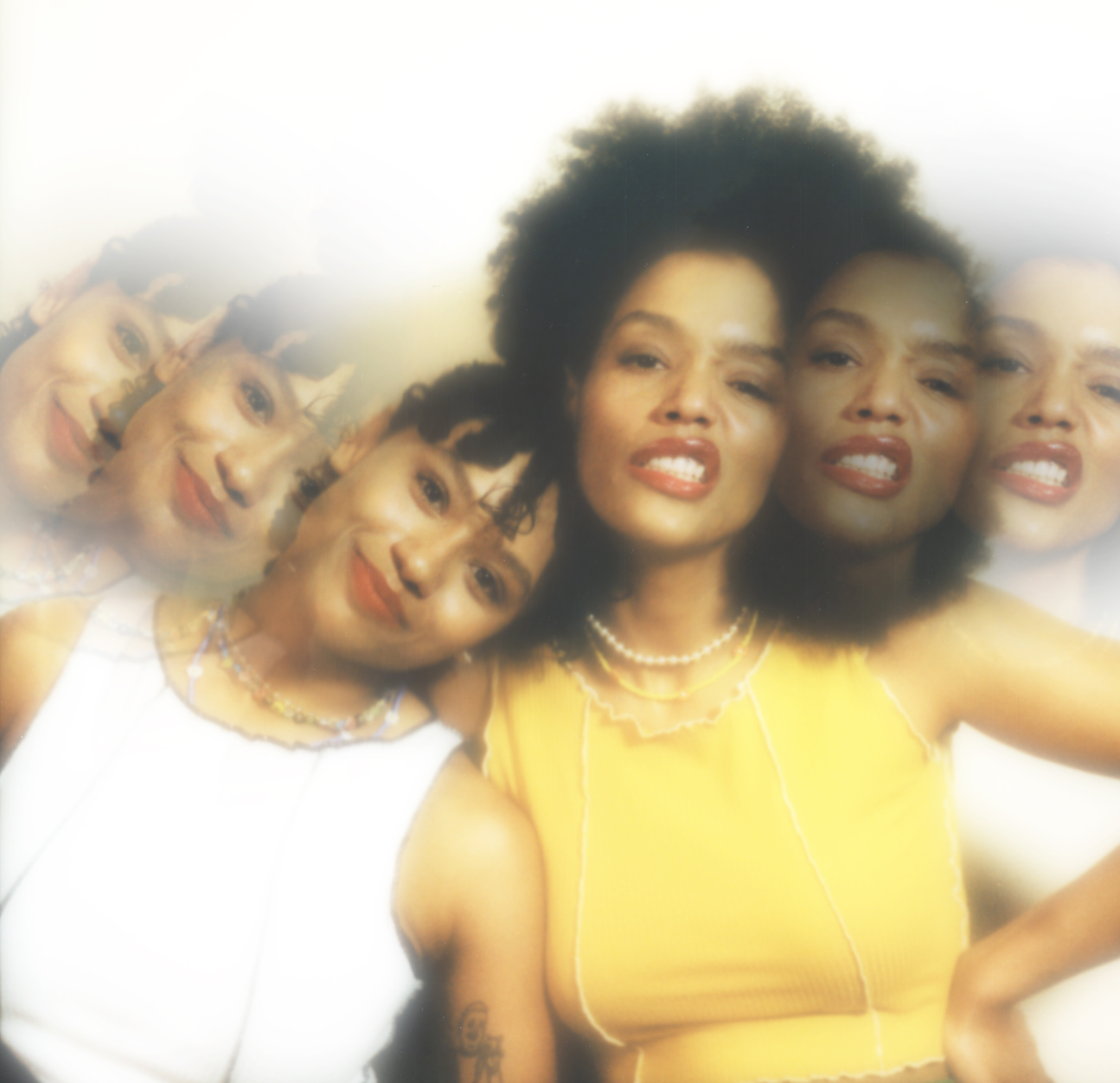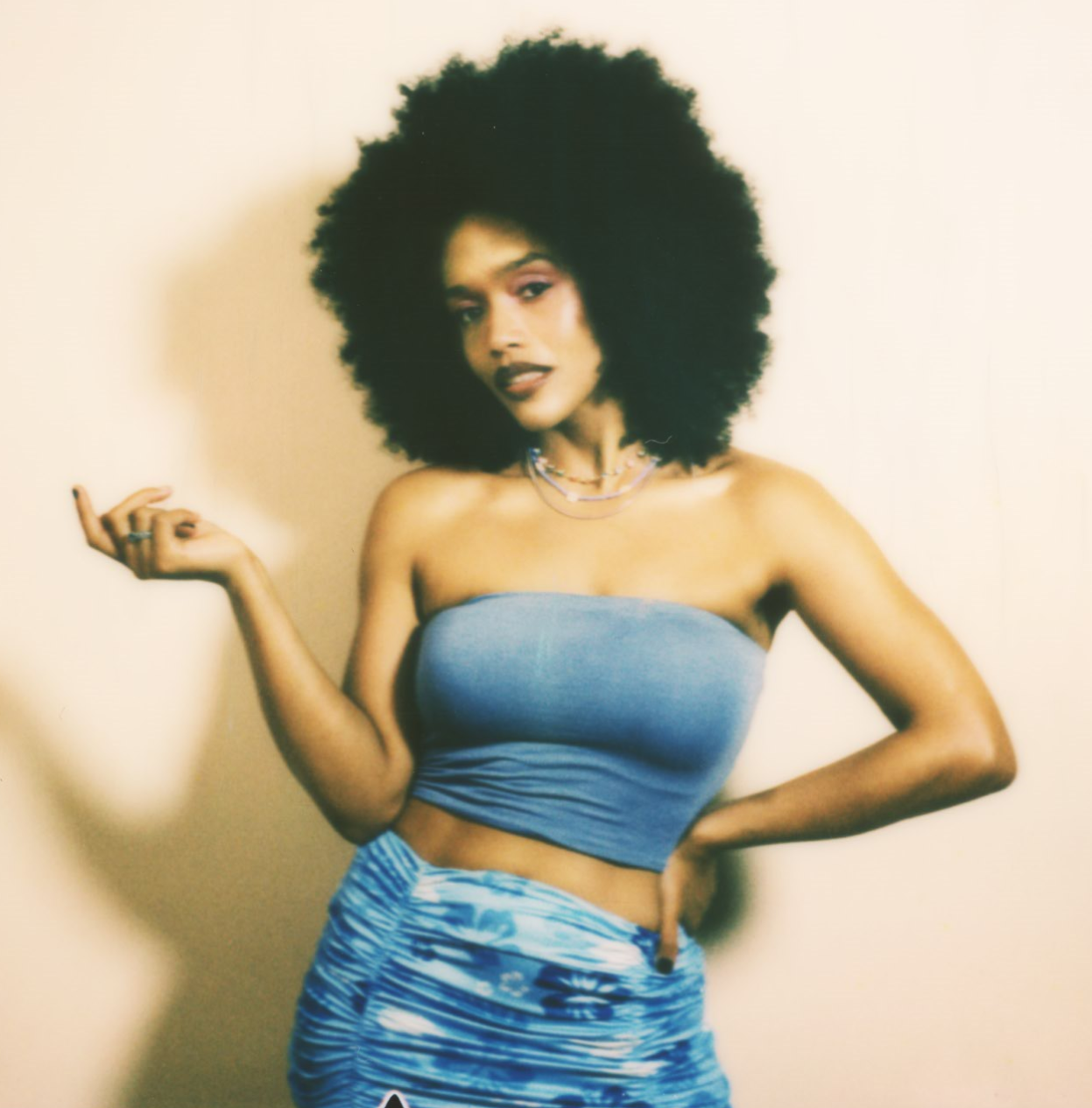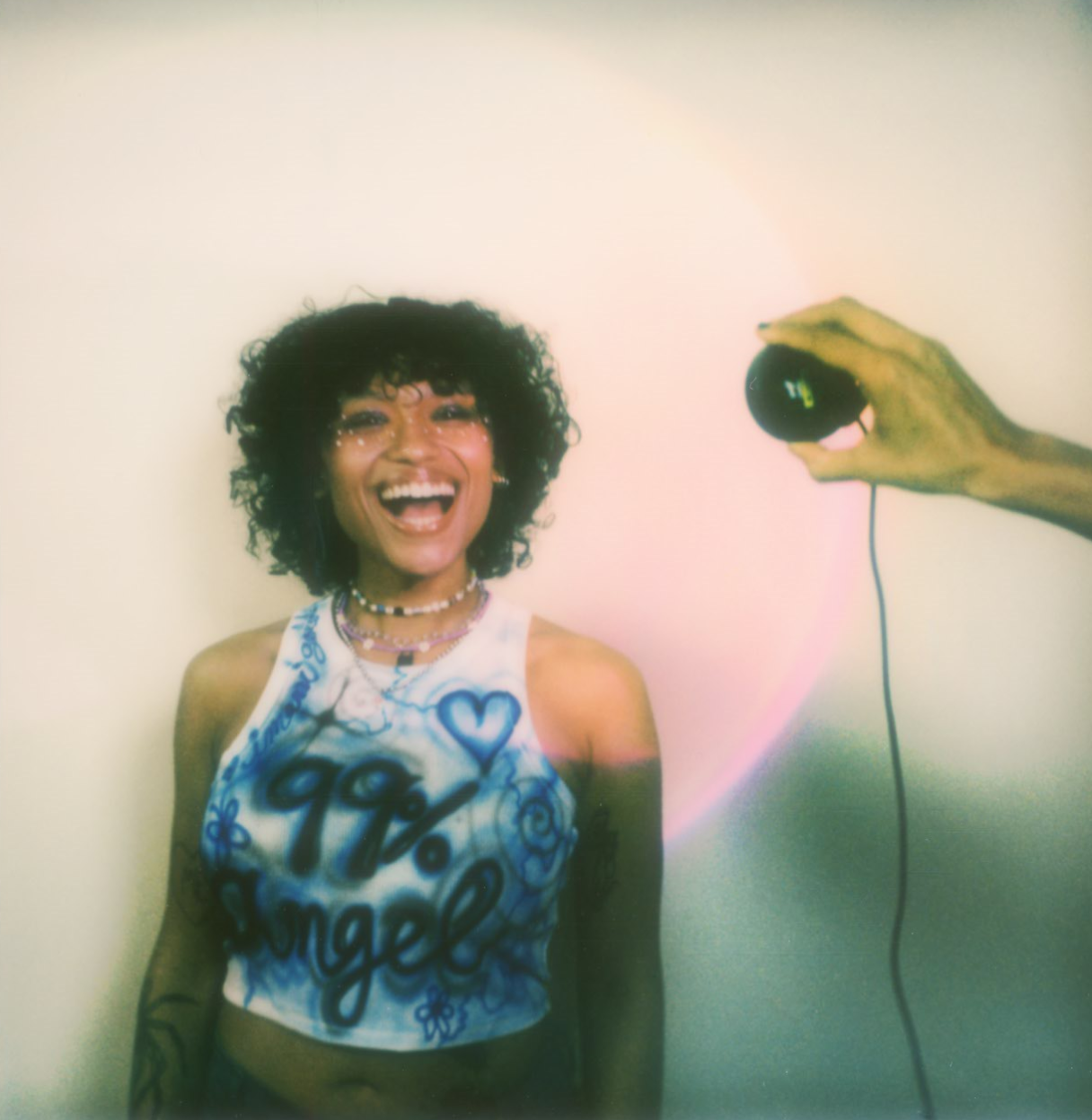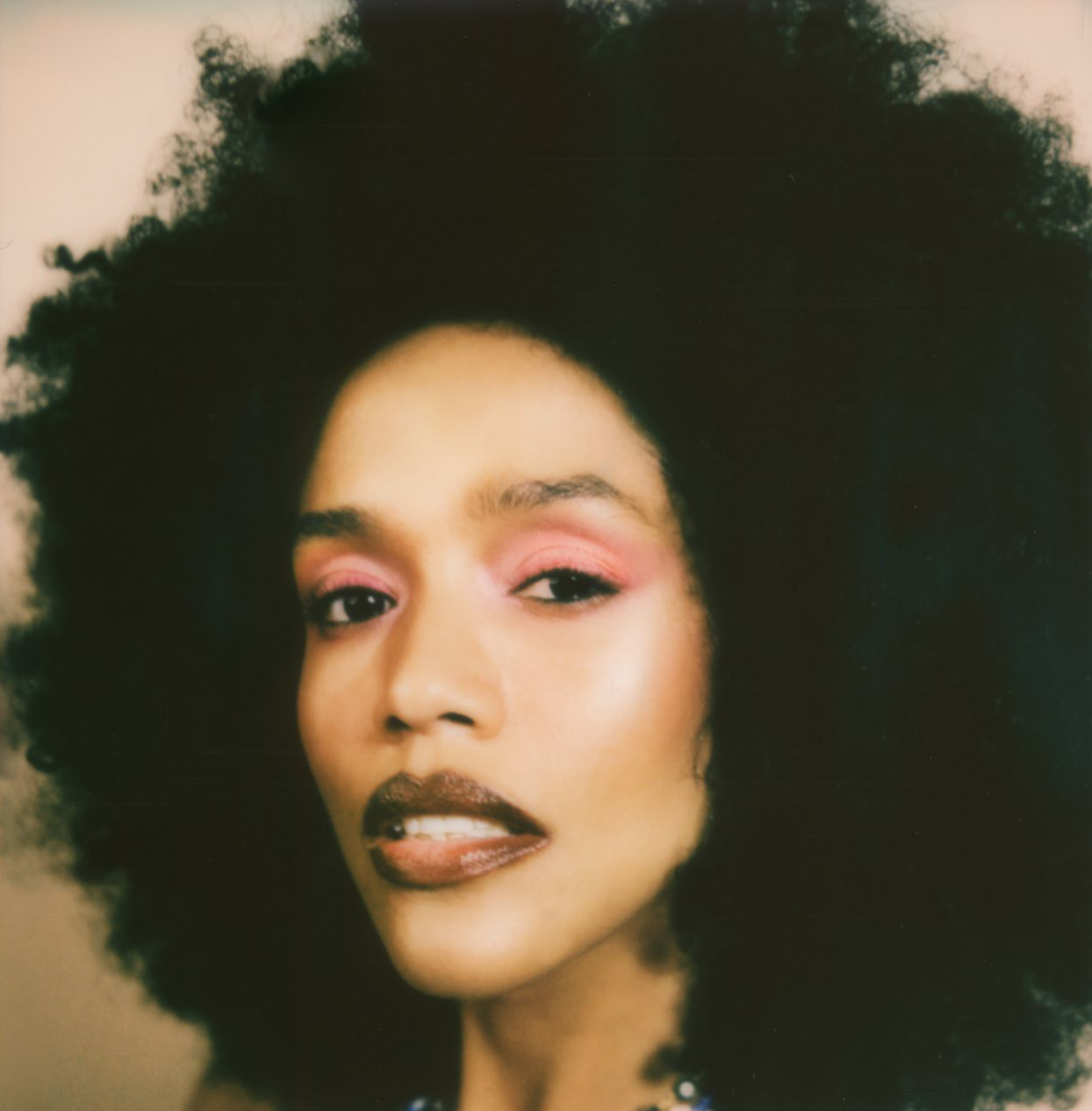Imanigold on Liberation Music, Angry Women and the Healing Power of art
Make it stand out
IMANIGOLD are an indie rock band and art collective for marginalised people based in Harlem, New York. Made up of sisters Nikki and April, they want to change the world. Not only through their music but through mutual aid, community, connection and physical space. IMANIGOLD spoke to our Community Editor Halima Jibril about liberation music, angry women and the healing power of art.
Where did the name IMANIGOLD come from?
Nikki: Well, Imani is my middle name. It means faith in Swahili.
April: Yeah, so we were looking for a band name, and then we just found it! It just came to us. We were just playing with words, and IMANIGOLD was where we landed because it felt right. IMANI is connected to our heritage, both the connection to Swahili and having faith in our place in history as Black people. The GOLD part came about because gold is forever. It's infinite and will probably be around until the world is nothing. We will still have particles of it floating around in the air. It's also really malleable, and that is a really great way to describe us as a collective and what we want to do. We want to be in the moment and be present.
___STEADY_PAYWALL___
IMANIGOLD is the soundtrack to our generation's fight for Black, queer liberation." I saw this quote on your website and thought it was very interesting. Mainly because when I was listening to your newest single, Continental Drift, I instantly thought that the song belonged in a movie. A Black coming of age film, to be exact. What was the songwriting process like for this song, and what inspired you to write it?
April: Well, Nikki has a really extensive background in film, and one of the things she's interested in is how queer Black stories are told and how they don't always have to be stories of loss and pain, and that they can have happy endings. Sad things don't always have to happen, and I believe that that is connected to liberation.
Nikki: When we made that statement on our website, it's more of a pitch. It's us telling people we are the movement, and this is the soundtrack. We are bringing something new to the table, and it's not exactly what you would expect, but I think that's why it works. We pay close attention to using and combining aesthetics, using bold colour and bold styling to try and mesh those things together, mesh our sound with our ideas.
April: To answer your question more directly about the writing process: I started writing this song several years ago when I was processing the recent death of my best friend, and I was also in a codependent relationship at the time, and I was kind of processing that as well. During that time, I kept thinking that I wanted to grow and change, but this THING (the relationship) that is bad, but not the worst thing, is making this experience really comfortable. I think you really hit the nail on the head by linking the song to coming of age film genre because that really is what so much of growth is. It's the ugly side of letting go and the ugly side of embracing newness, and that is kind of what the song is tackling. Additionally, I grew up playing Americana folk songs in the Quaker church, a protestant religion with a lot of history connected to the underground railroad and the abolition of slavery. Now a lot of that looks like anti-war work, anti-prison work and various political organising in that way. So, we really came from this tradition of using music to fight for liberation; that was what we were brought upon. What I think good liberation music does is that it connects to the individual experience. The song A Change is Gonna Come by Sam Cooke doesn't say, "we were born by the river," It says, "I was born by the river" - it was this personal experience that connects to this border experience, and that's what we really believe in. So we hope that also comes across in the song.
Now you've mentioned liberation music, I have to ask you what your favourite liberation song is?
Nikki: That's a tough question! I think it's A Change is Gonna Come for both of us.
April: Yeah, I wouldn't say it's my favourite song of all time, but it does capture the individual experience of being black. Sam says, "I go to the movie/ And I go downtown / Somebody keep telling me / Don't hang around," those are the stories we're telling! I think most Black people have experienced feeling overwhelmed by all of the things happening globally to people who look like us that we lose sight of our own personal, day to day experiences. Part of why we tackle these significant issues in the way we do, the reason we say Black Lives Matter and not just Tamir Rice life matters, is because it permeates so much and it permeates so many aspects of our lives, and I think that song highlights that so well.
Nikki: Okay, so for me, one of my favourite liberation songs is Bossy by Kelis. It's not really that revolutionary of a song, but it definitely makes me feel liberated. I do just love it, and I've always been bossy, and it's such a negative term used against women. Also, Visions by Stevie Wonder, I just love how the song is about envisioning a better world.
Who inspires you musically? When I was listening to your music, I didn't really know where to place your sound.
April: I love Doja Cat, and I love Lil Nas X. I also love Megan Thee Stallion. But when it comes to making revolution irresistible, you can beat Lil Nas X, so we are super inspired by all of them in so many ways, including songwriting. Regarding what you might be hearing in our music, I really love Radiohead, and I keep coming back to how influential they are for me. I love how emo they are, super 90s and grungy, and I think they're great at capturing that sound. I like Radiohead and Tom Yorke because they play with their music, it's very melancholy, and I think our music is like that too. Early 00's, emo, pop-punk, we are super influenced by all that. Some of the specific artists are definitely Nirvana, Tegan and Sara, who are sisters, specifically queer sisters like us.
Nikki: I used to play folk-punk when I was a teen. I was listening to Leftöver Crack, Flyleaf and Eminem. You mentioned it when you mentioned coming of age, we are going for that early aughts, high school, middle school feeling, and you can see that in our styling and sound. We lived through that era, but we were just kids, unhappy, and we didn't have things. But now we can buy those cute outfits we wanted to wear as kids. But yeah, a lot of our inspiration comes from that nostalgia. We want to relieve that time in the way we wanted to.
What are your thoughts on anger within music? I think we are seeing a lot of angry girl music at the moment from the likes of The Linda Linda's, Oliva Rodrigo and Willow Smith etc. I feel like music has always been a zone where Black people can be angry without policing to some extent.
Nikki: So I think that contradictions, multiple feelings and multiple conflicting feelings existing at once are something I really believe in and how I live my life. Octavia E. Butler gave me that idea in Xenogenesis, I think that comes alive in many ways in our music because anger isn't the first thing that you hear in it, but it is very much there. I think that our music is a perfect example of that, especially in Continental Drift because, like, all my friends cry when we're mad. Still, there is this one image of the angry Black girl or person, but the reality of it is actually a very sad feeling. It's not just that one feeling; there's anger and loneliness and sadness and feeling unheard and all of these things. Showing the complexity of anger is a big part of our goal.
April: People are afraid of Black women's anger because it's very powerful and because it's justified. Black women's anger shows the world its ills. Hip Hop and women in hip hop really paved the way for the likes of Olivia Rodrigo being so angry in her music. We know that Hip hop has always been subversive and has always been the music of the oppressed in part because of where it came from. So it's not a coincidence that we are seeing more anger come forward in more genres. One song that Nikki got me to see the goodness in is Ring the Alarm by Beyonce, where she gets really mad. That song really captures that multileveled anger that Nikki was talking about that is so critical to explore. Hip hop has really carved out a space that allows women to be angry in music. But I will ask this question… how much of that anger that we see women singing about is about men? How much are we continuing to centre men in our anger vs centring ourselves? In my writing, I'm always asking myself: What does it mean to centre the Black female experience in work about oppression?
I think you and Solange sit in that same realm of making angry music that isn't outwardly angry. I'm thinking specifically about her song Mad, which is such a soft song but is literally about being very fucking angry at Black oppression, and the policing of that anger.
Nikki: I wanna add that we're inspired by the freaky, and I thought about Azealia Banks and how anger is not really present in her music. She makes dance music. But her career has kind of been tarnished by her anger. It's very much not accepted, and yeah - she has some pretty bad takes, but there isn't space for it. Like when Black women do write about music, it has to be about a man, preferably a Black man, so nobody gets offended. So Black women talking about being angry about anything other than a Black man will not be tolerated. But one of my additional all-time favourite people is Tupac. He was mad as hell on like half his albums, just like "FUCK YOU AND YOUR CREW." Like he is angry, and he's not holding back!
I think you're really right about Azealia Banks because I think people are more willing to hold space for people like Kanye West than her, and that's not to say people hold space for Black men and their mental health. But, still, in this case, people have been much more willing to show empathy towards Kanye and his mental health struggles than Azealia.
Nikki: Yeah, Azealia is so creative in the same way and so cooky and should totally be just as famous as Kanye.
You've also created the IMANIGOLD Collective. An art collective seeking to create space for marginalised people to gain strength and healing. Why do you think it's so important to promote the healing power of art?
Nikki: That's actually an idea we have been sitting on for a while. We wrote that a few years ago. I've found myself very frustrated and very confined by the lack of physical space that I am actually allowed to inhabit as a young person who doesn't own land or own really any significant thing. So one of our big missions as a collective and just in my life is to get some space, actual literal physical space that is not the internet. Where I can put my shit, and nobody can take it.
April: Our shows are one of the ways our collective comes together. Our shows aren't just like you pay £5, you see us sing and then go home, our shows usually have a specific social justice component. Whether it's celebrating Juneteenth or creating a healing space after the inauguration. We also make sure people can access our shows, people with different physical needs and financial needs. This has definitely strengthened our desire to have our own physical space. I was recently thinking of the Virginia Woolf essay, "A Room of One's Own," that's about women being creative and actually having space to do it. When it was written in 1929, women didn't have their own rooms, and still today, women continue to lack space. Having space is a revolutionary act, and I think it's heavily connected to art and making art.
AN IMANIGOLD PRODUCTION: Words: Halima Jibril | Producer + Stylist: Nikki Kae | Photographer: Chris Garcia | Makeup + Angel/Devil Shirts: Haydyn Lazarus | Assistant Producer: Maay Brice | Assistant Producer: April Kae.







